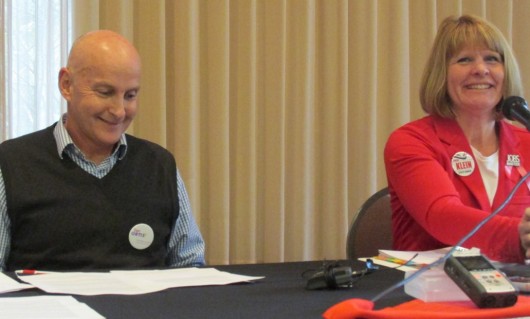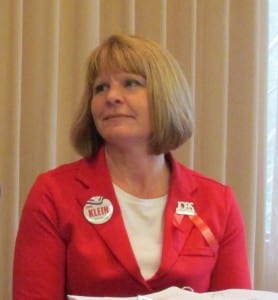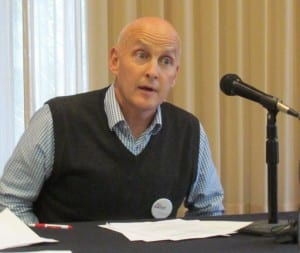 House District 36 covers the southern tip of Alaska’s Southeast region. It includes Ketchikan, Saxman, Wrangell, Metlakatla, Hydaburg, Hyder, Loring and Myers Chuck. Two Ketchikan-based candidates hope to represent those communities in the state Legislature: Republican Chere Klein and independent Dan Ortiz.
House District 36 covers the southern tip of Alaska’s Southeast region. It includes Ketchikan, Saxman, Wrangell, Metlakatla, Hydaburg, Hyder, Loring and Myers Chuck. Two Ketchikan-based candidates hope to represent those communities in the state Legislature: Republican Chere Klein and independent Dan Ortiz.
Chere Klein worked as a legislative aid for retiring Wrangell Rep. Peggy Wilson, and now Klein wants her boss’s job. When asking for voter support, she cites her experience in the Legislature and her commitment to maintaining and increasing employment opportunities.
Dan Ortiz taught for about 30 years at Ketchikan High School. He said that as an independent, he would be free to vote based on what’s best for the district, without considering special interests or partisan politics.
Ortiz has taught social studies, economics and history, and has been the high school Drama, Debate and Forensics coach. He said it was part of his job to know and understand current events on a national, state and local level.
“So I’ve always been very much interested in the process: The process of government, the process of people, being involved every day in society,” he said. “It was always an interest of mine and perhaps even a goal of mine to one day serve in public office.”
Klein said her interest in public office started as a teenager, and she’s been actively
involved with the Republican Party for about 20 years.
“With Rep. Wilson’s retirement and my having worked in Juneau with her, I thought it was the ideal time to step forward and start working the issues that I think are important for our community and that’s, No. 1, that small business needs to be represented, because that’s what creates the jobs in our communities and what allows our kids to come back,” she said.
One task legislators are expected to perform is obtaining money for capital projects. With a shrinking budget, that is becoming more difficult than in past years. Klein said legislators prefer to focus their cuts on the operating budget, and not the much-smaller capital budget.
“Because it brings, especially to the smaller communities, it brings the jobs and helps to keep those communities going,” she said. “So, of course I would work the best I can to see what it can bring in to the community while making sure we have a sustainable budget for our state.”
At a Chamber of Commerce forum, Klein talked further about budgets, and said the Legislature needs to look at what’s really needed, and what’s just nice to have.
“I think there’s a pretty big divide on those two things. So we need to see what we actually need as a state to continue to go forward, in order to be able to sustain that budget,” she said. “But number one, we need to be developing our resources to increase our revenues. Not just looking at what we can cut, cut, cut, but what we can do to increase.”
Ortiz agreed that it would be his job to promote projects identified by the district’s communities. But, he said the most practical way for the state to save money is through reducing the capital budget. He told the Chamber audience that neither side wants to take responsibility for the significant cuts the state is going to have to make.
“I think the only solution is going to be for everybody to come together, to roll up their sleeves, to work in a bipartisan fashion, to make tough decisions,” he said. “I think what can be done is everybody to take off their red and blue clothes and say hey, look, let’s all work at this together, let’s be nonpartisan, let’s solve the issue of the budget for Alaska.”
Klein has stressed throughout her campaign that, as a Republican, she’s guaranteed to be in the majority caucus, giving her more influence over legislation.
“Depending on what the makeup is and how the elections go in the rest of the state, would be the determining factor as to whether or not my opponent could ask to be part of the majority, and then it would be up to the majority to determine whether or not they needed or wanted him to be a part of that,” she said.
Ortiz argued that non-Republicans have been invited into the majority caucus in the past and there’s no reason it can’t happen again.
“I’ve said from the very beginning of my candidacy that I will be a part of the caucus that’s in the best interest of my district,” he said. “It’s my job to do so. Most likely, that will be a part of the majority.”
Ortiz expanded on that during the Chamber of Commerce forum, stating that as an independent, he would actually be in a better position to influence the Legislature.
“If you have a caucus that really wants you to be a part of their group, either to create a supermajority or to create a stronger voice if you’re in the minority, there’s going to be an incentive to offer me a position on an important committee in order for me to jump along with that particular group,” he said.
Speaker of the Alaska House Mike Chenault and Alaska House Rules Committee Chairman Craig Johnson addressed the caucus issue in an editorial sent via email to KRBD. They write that Klein would be welcomed into the majority if she wins. However, they write that Ortiz would have to ask to be included, and there’s no guarantee.
The general election is Tuesday, Nov. 4, and polls throughout the state are open from 7 a.m. until 8 p.m.
KRBD will offer special statewide election coverage from Alaska Public Radio Network starting at 9 p.m. Tuesday, along with local updates throughout the evening on the House District 36 race.







